Rock eating in dogs can be the result of a medical, behavioral, or even psychological condition.
When a dog keeps eating non-edible objects obsessively with no results from training, it could be due to a condition called Pica.
Dogs are weird and sometimes they eat things that they shouldn’t
If you have come here because you have a dog that has a problem with eating rocks, meet Leroy.
Leroy is my 10-year-old Newfoundland that ate rocks for a little over 4 years.
I always knew that his rock-eating was a serious condition and that one day it would lead to something bad so we did our best to stop to it with little help from anyone else.

If you’ve found this post because you’re desperate to find a way to get your dog to stop eating rocks, I understand.
We’ve been there and I understand your frustrations and concerns.
I understand that right now you might feel like you’re a bad dog owner because you can’t get your dog to stop. I felt that way too.
You’re probably frustrated because everyone is telling you that you need to train your dog, but your dog is trained.
I get it.
Let’s take a look a closer look at why some dogs eat rocks and how you stop them from eating them.
Why Do Dogs Eat Rocks?
Not all rock eating is equal.
Dogs are curious creatures and sometimes they just want to investigate something a little further than just giving it a quick sniff.
Puppies may bite, chew, or swallow rocks because they are curious or because they are teething.
Adult dogs might eat rocks because they’re bored or anxious.
However, dogs that obsessively seek out rocks and eat them might have a condition called Pica.
Pica is the ingestion of non-edible items.
Pica is either caused by a medical issue or it is a behavior issue and it can be a very dangerous condition for dogs.
Medical issues that have been known to cause Pica an intestinal disease such as:
- Inflammatory Bowel Disease (IBD),
- hormonal imbalances
- diabetes
- thyroid issues
- diabetes
- intestinal parasites
- malabsorption issues
Behavior issues that may cause Pica are:
- stress
- separation anxiety
- boredom
- compulsive disorders.
Pica can cause dogs to vomit, have diarrhea and get intestinal blockages caused by the items that they eat.
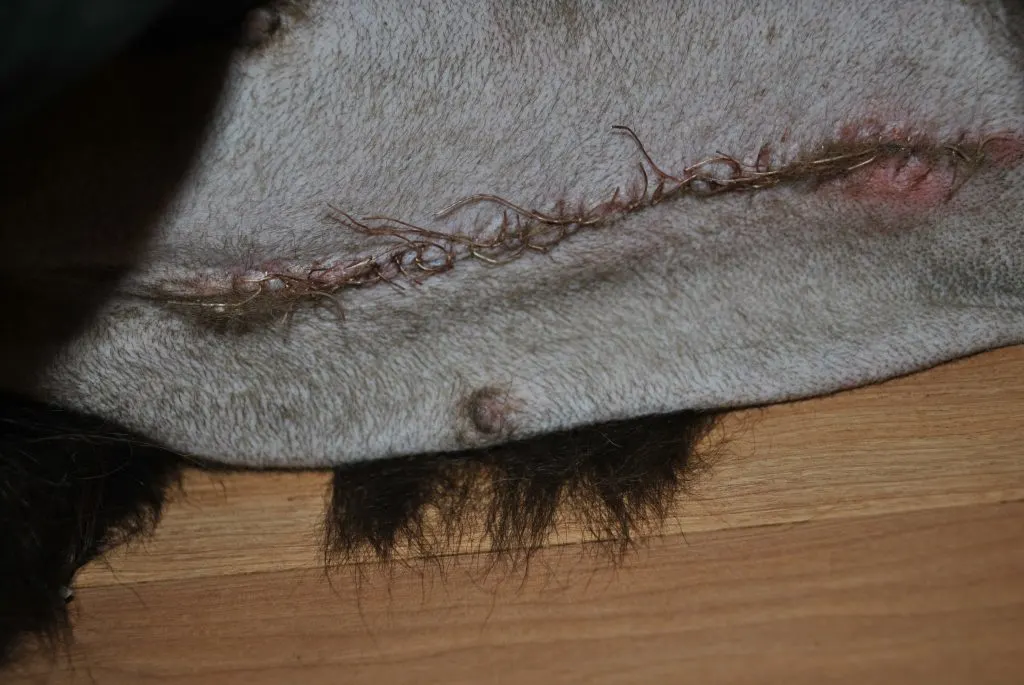
Some will require emergency surgery to have rocks or other inedible objects removed from their stomach.
Try To Understand Why Your Dog Is Eating Rocks
It can be frustrating when you have a dog that eats rocks, especially when you are trying to do everything thing that you can to help them.
But it’s important to take a step back and look at why they are eating rocks.
Are they eating other inedible objects like socks?
Are they destructive?
Are they eating and drinking normally?
How are they acting?
My dog Leroy was never a “normal” dog.
He ate other inedible things like batteries, small children toys, and coins.
He didn’t eat these things every day but it seemed like he went through phases.
He also tries to eat something every time he is outside.
In the spring, summer, and fall it was rocks, dirt, and mud.
In the winter it was snow and ice.
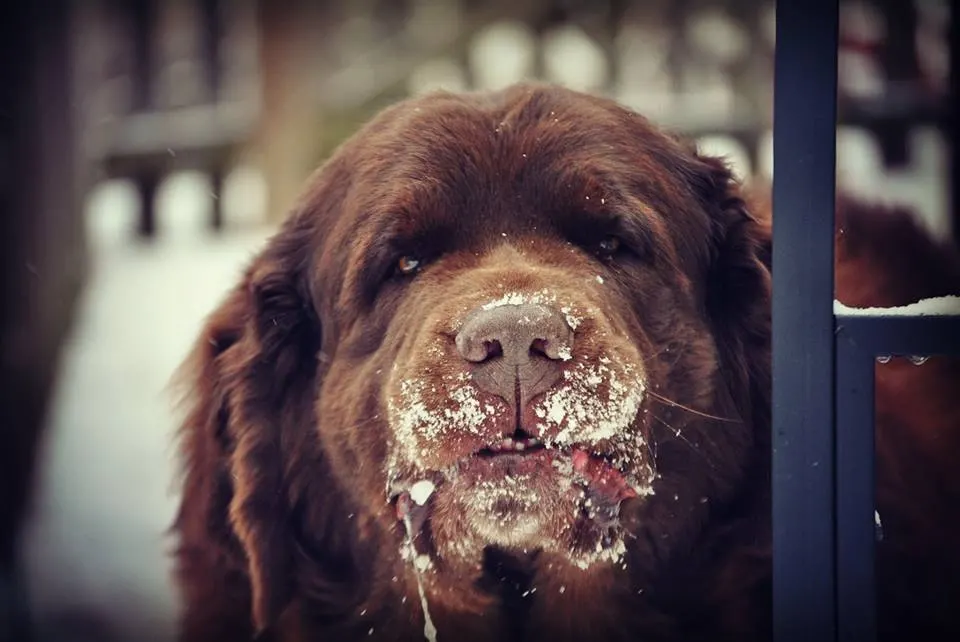
Leroy was also a picky eater.
Some days it was almost as if he wanted to eat, but he couldn’t because he knew he wouldn’t feel good if he did.
Ways To Stop Your Dog or Puppy From Eating Rocks
Puppy rock-eating
When a puppy eats rocks it’s usually because their curious and most will normally outgrow this behavior.
When an adult dog, thathas never eaten or chewed on a rock, starts doing so, this will require your attention.
Management.
This sounds easy but in reality, it’s not.
Rocks are everywhere.
We had an above-ground pool that had rocks all the way around it and we had to remove all of those.
But rocks are used in many areas for landscape purposes and drainage.
Sometimes it takes time and money to redesign your backyard.
That’s why we had to block off the areas where rocks were until we had the resources to remove them.
If your dog is determined to find rocks, think of all the places where they can find them.
After we removed all the rocks from our yard and blocked off the areas that we could not, Leroy dug up around the foundation of the house and ate 62 rocks.
28 rocks were surgically removed, 34 he had vomited up in the morning.
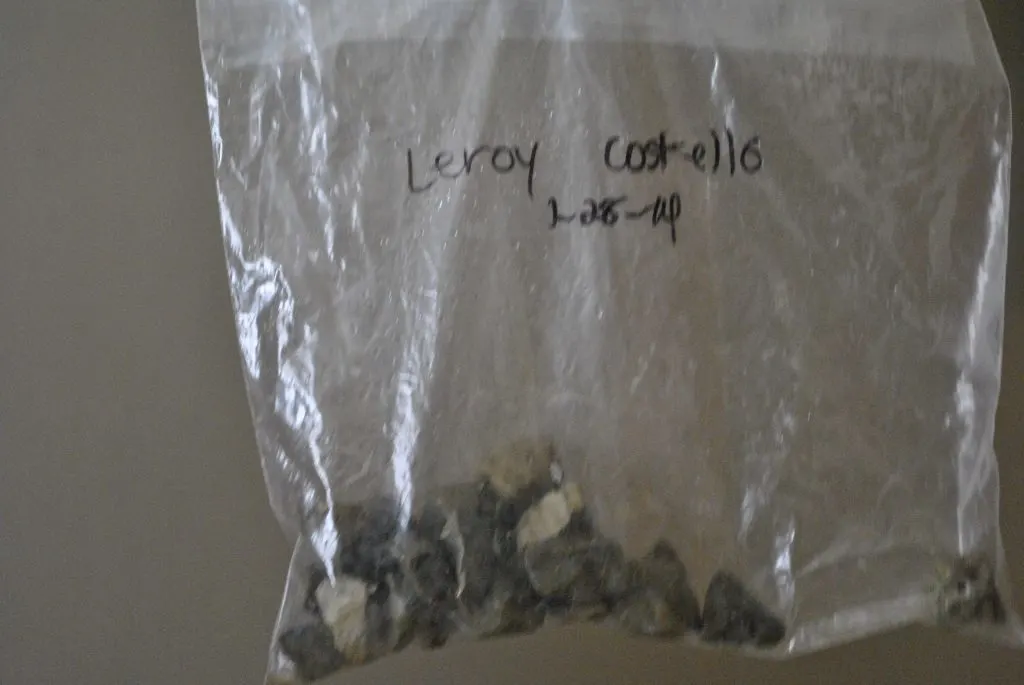
Don’t leave your dog unattended around rocks if you can’t trust them.
If that means that you have to monitor them outside at all times, that’s what you should do.
Invest in a basket muzzle.
If you can’t be outside with your dog at all times or if your dog eats rocks on walks or when outside of the house, use a muzzle.
We did have to this with Leroy for a short time because he would try to pick up every rock that he saw on our walks.
A Baskerville muzzle is a good option or a Bumas dog muzzle.
A muzzle doesn’t always mean a vicious dog, a dog could be wearing a muzzle for several reasons, including keeping them from eating something that is dangerous to them.
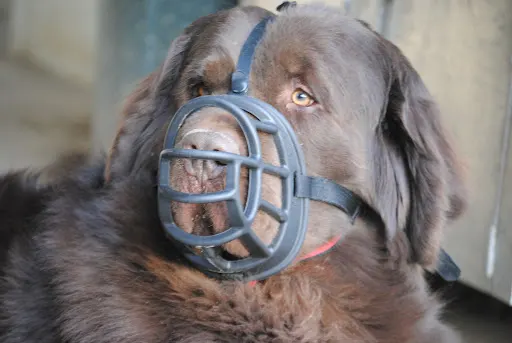
Don’t let people make you feel guilty about this either. I took a lot of heat for putting my Newfie in a muzzle and now that I look back at it, it makes me a little angry that I let people make me feel bad about this. I was trying to protect my dog.
More often than not a dog in a muzzle equals a responsible dog owner.
If you’re considering a basket muzzle, make sure to get one that allows plenty of room for a dog to pant, eat and drink. You can also train a dog to wear a muzzle with a few easy steps.
Training. I leave training for last because this is the one step that was always recommended to me first and it was the most frustrating recommendation because Leroy was trained. He knew how to “drop it” and “leave it”.
Leroy didn’t have a training issue he had a medical issue and no amount of training was going to cure his medical issue.
Treat the medical condition.
If your dog has eaten rocks on more than one occasion, you’ve seen rocks in their stool, or they have vomited up rocks more than once, take your dog to the vet and have a discussion with them about how concerned you are.
Ask for some blood tests to check out things like their kidney function, liver function, and mineral deficiencies.
I would recommend checking the cobalamin/folate. Low folate usually means that a dog is not absorbing nutrients and this could give you a starting place for a medical issue without spending thousands of dollars.

Make sure that you mention to your veterinarian about all of your dog’s habits and be direct during your visit.
We had so many vet visits but very little testing and direction before Leroy was diagnosed with Inflammatory Bowel Disease.
If you find a medical diagnosis, hopefully treating the medical issue will stop the dog from eating rocks.
Leroy hasn’t eaten a rock since he was diagnosed with IBD. He still tries to eat mud and snow but (knock on wood) no rocks.
Treat the behavior issue.
If medical conditions have been ruled out then it’s time to treat the behavioral issue.
The first step will be to find out the reason behind your dog eating rocks. Taking the time to observe your dog’s behavior is a great place to start. Do they seem anxious or on edge?
Do they like to chew on things?
Working with a local dog trainer and supplying your dog with more mental and physical stimulation may be the answer.
Remember not to yell at your dog for eating rocks. This may only increase their stress and anxiety and cause more issues with behavior.
What To Do If Your Dog Does Eat a Rock
If you have a rock-eater, make sure to reach out to your veterinarian and talk to them about it
In most cases, one rock isn’t normally a cause for concern but if the rock-eating continues, you definitely want to take action.
If medical issues are ruled out, I would start focusing on changing the dog’s behavior towards rocks.
You can reach out to a professional dog trainer in your area for guidance.
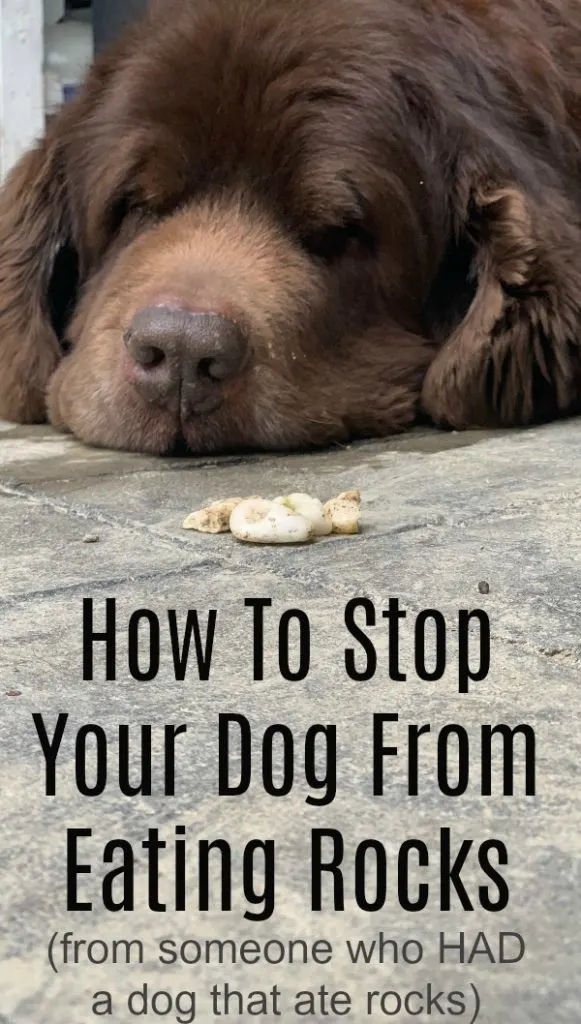
Is there hope for dogs that eat rocks?
There is.
Leroy’s history with eating rocks was long and difficult and so was determining the cause of it.
We had many roadblocks, many tears, many tests, a few surgeries, and many close calls but he hasn’t eaten a rock in over 4 years.
We battled his rock-eating for most of his life and unfortunately, he’ll suffer the consequences of eating those rocks for the remainder of his life.
He’ll never be cured and will always have IBD.
He will have good days and bad days.
He still tries to eat mud BUT he never turns down his food, is always by our side and is as smart as they come.
I am not a veterinarian. The information in this post is not to treat, diagnose or cure your pet. All information is based on my personal experience with many years of Leroy eating rocks and his eventual diagnosis of IBD.
Cathy Armato
Monday 4th of March 2019
I never knew Leroy had this issue. That must have been so hard to deal with, but thankfully he hasn't eaten any more rocks. It's not an uncommon problem from what I can see. This is such helpful information, thanks. Sharing! Love & Biscuits, Dogs Luv Us and We Luv Them
Tails Around the Ranch
Sunday 24th of February 2019
I cannot even imagine how difficult this must have been for you but give you loads of gold stars for your helping your clever Leroy with his condition. ⭐️⭐️⭐️
Jen
Tuesday 26th of February 2019
It was so hard, especially knowing that it would eventually catch up with him. I'm so lucky to of had such amazing support through our community!
My Golden Life
Sunday 24th of February 2019
Oh, Jen, I remember how heartbreaking it was for you and your family! I'm so glad Leroy stopped eating rocks! I also remember and appreciate all the support you gave me when Ducky started eating stuff in the yard. She still eats birdseed more than I'd like, but at least she can get rid of it easily. I'm glad you've written about this again. It was probably a bit cathartic for you. Give Leroy - and Sherman - hugs and kisses for me!
Jen
Tuesday 26th of February 2019
Thank you Sue and I have to thank you so much for all of the support that you gave during that trying time and for your continued support and love to this day! Keeping you in our thoughts and prayers with the recent loss of Shadow. Leroy now has 2 guardian angels looking over him <3